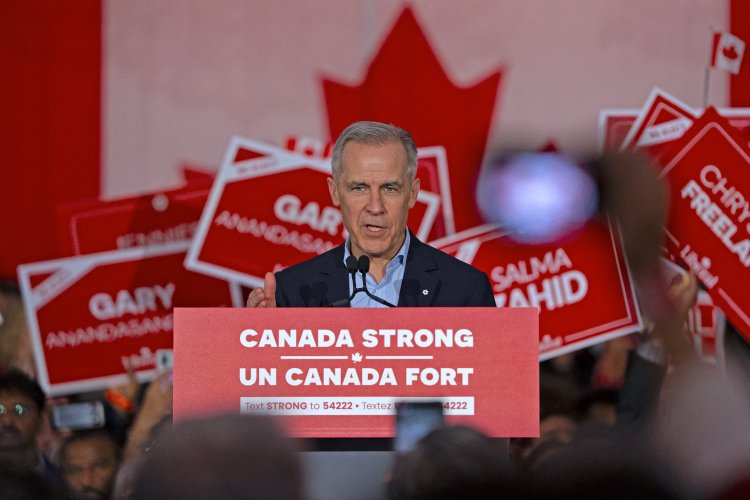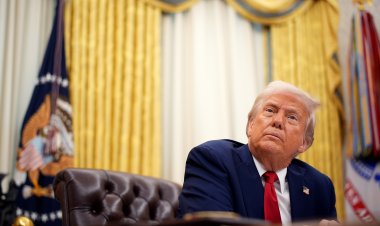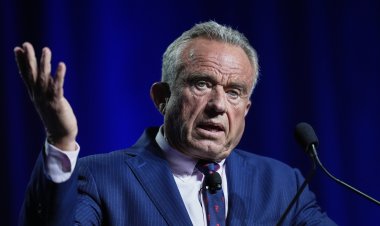Mark Carney Introduces a Strategy to Shield Canada from Trump's Policies
OTTAWA — Liberal Leader Mark Carney unveiled his election platform on Saturday, emphasizing increased military spending and strengthening Canada's position against Donald Trump’s expansionist agenda. "In this crisis we have to prepare for America’s...

"In this crisis we have to prepare for America’s threats to our very sovereignty. They want our land, our resources, they want our water, they want our country,” Carney declared Saturday morning in a suburb east of Toronto.
“President Trump is trying to break us so that America can own us, and that will never happen. Canada is not America, and it never will be, but we need to do more to just recognize that. We need a plan to deal with this new reality."
Should the Liberals secure a fourth mandate, Carney proposed to allocate C$30.9 billion toward defense over the upcoming four years, aiming to meet Canada's NATO defense spending target of 2 percent of GDP by 2030—two years earlier than currently pledged.
In 2024, Canada allocated only 1.37 percent of its GDP to defense, falling short of the target.
A significant portion of the new funding is intended to strengthen Canada’s North and deter China's influence, which has been attempting to establish ties with Indigenous communities in the Arctic.
“The North faces existential threats as countries try to take advantage of new shipping routes opened by climate change, exploit our critical minerals, and encroach on our borders,” the plan states. “We will keep Canada strong, free, and sovereign.”
Half of the proposed spending will be directed toward acquiring new military equipment and weapons for the Canadian Armed Forces, including submarines and icebreakers to secure coastlines, particularly in the Arctic, against Russian and Chinese aggression. This initiative will also include new drones for aerial and maritime surveillance.
The spending plan outlines three main allocations:
The first is dedicated to attracting new recruits to the Canadian Armed Forces, increasing salaries for military personnel, and enhancing housing on military bases.
The second focuses on acquiring new equipment for service members, such as self-propelled artillery systems and ground-based air defense capabilities, which would be available both for domestic use and deployment in Europe. The Liberal government has already announced a collaboration with Australia to develop early-warning radar defense systems.
The third allocation will support advancements in quantum computing and AI, areas where Canada is at the forefront of research. Military applications for AI may include autonomous vehicles, war simulations, and intelligence processing, according to a Liberal Party official during a pre-launch briefing. The party intends to collaborate with Indigenous partners on infrastructure, community development, and energy initiatives in the North, creating an environment that attracts residents and employment. Carney also committed to enhancing Arctic security cooperation with Europe.
Conservative Leader Pierre Poilievre, Carney's primary political opponent, has similarly pledged to prioritize defense if he wins the election on April 28.
On Friday, the Conservative Party provided further details of their defense plan, which includes upgrades to NORAD and establishing a permanent Arctic military base in Iqaluit, Nunavut's capital and largest community. They also propose reconstructing a base in Inuvik, situated about 125 miles north of the Arctic Circle in Canada’s Northwest Territories, to enable rapid responses to Russian and Chinese incursions.
Earlier in the month, at NATO headquarters, Secretary of State Marco Rubio expressed his expectation that military alliance members would commit to increasing spending, potentially up to "5 percent."
“If the threats truly are as dire as I believe they are — and the members of this alliance believe they are, then that threat has to be confronted by a full and real commitment to have the capability to confront these things,” Rubio stated to reporters in Brussels prior to an April 3 meeting with NATO Secretary General Mark Rutte.
In response to Rubio’s target, Poilievre remarked that it would ultimately be Canada’s decision on “exactly how much we spend” on its military.
“I will say to the Americans that if we can get a rapid conclusion to this ridiculous trade dispute in a way that protects our sovereignty, ends the tariffs, then I will put all the proceeds of that additional trade to work rebuilding our armed forces for a change,” he said.
The Liberals assert that their platform aims to safeguard Canada’s sovereignty and culture from the United States and Trump’s “unjustified trade war,” which Carney claims seeks to undermine Canada.
“America’s unjustified and reckless trade war threatens Canadian jobs, businesses, and our way of life. . . . In the face of this threat, we have a plan to build the strongest economy in the G7,” Carney noted.
The proposal also emphasizes reducing trade barriers among Canada’s provinces to mitigate the impact of Trump’s tariffs, offering support for the agriculture sector affected by the trade disputes with the U.S. and China, and expanding the auto sector’s supply chain in Ontario, where 500,000 jobs are at stake.
Furthermore, the party aspires to establish new trade partnerships with Europe and Asia, eyeing potential agreements with MERCOSUR, a South American economic bloc, and ASEAN, a regional group comprising ten Southeast Asian nations.
While Carney plans to increase defense spending, he indicated that a Liberal administration would reduce expenditures, mainly within the federal public service and on consultants, with the goal of balancing the operating budget by 2028, all while ensuring the protection of services like healthcare, pensions, and employment insurance.
Carney also committed to leveraging Canada’s G7 presidency to advocate for Canadian values globally, stating the importance of "working to protect the rules-based international order from those who want to destroy it."
Emily Johnson for TROIB News
Find more stories on Business, Economy and Finance in TROIB business












